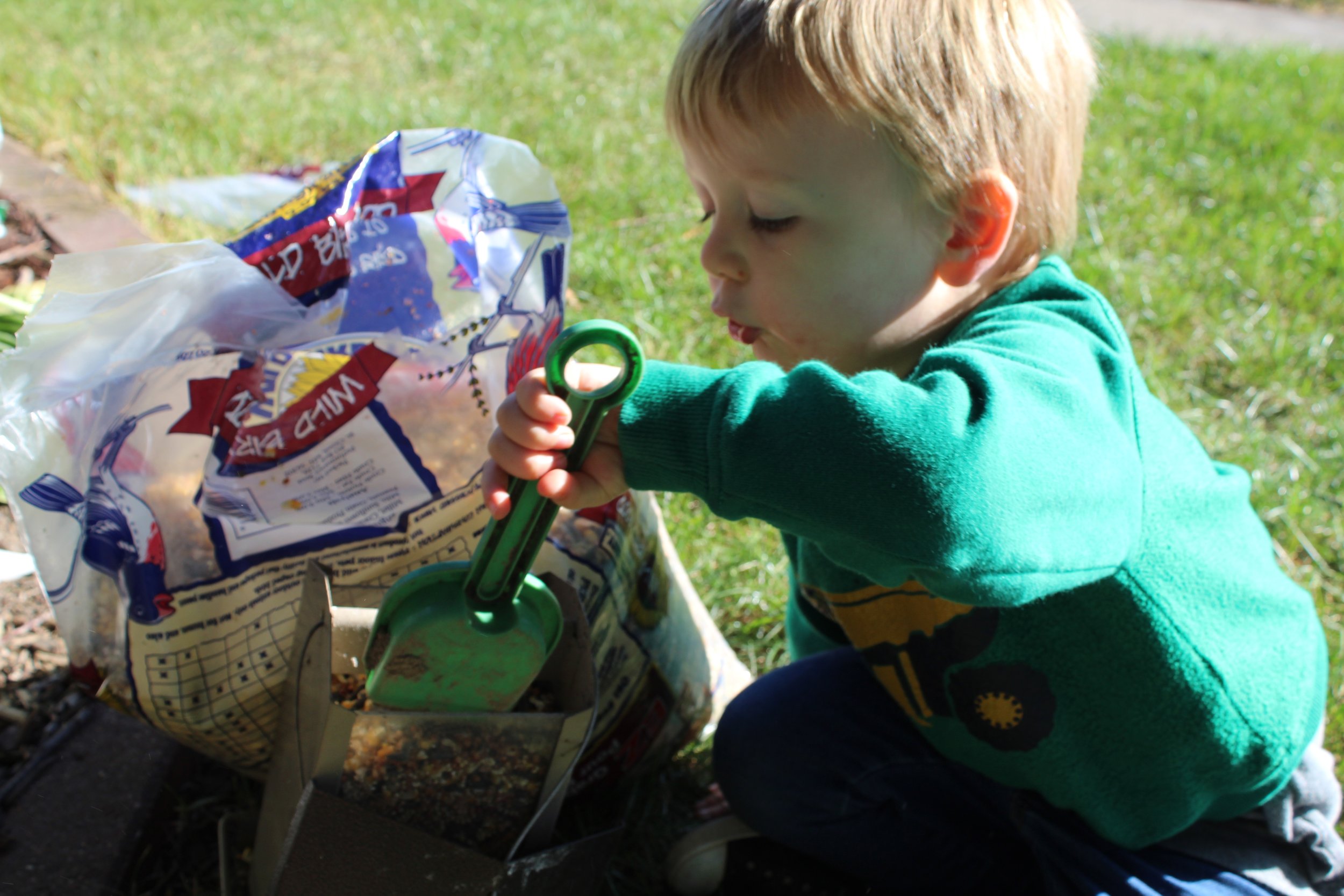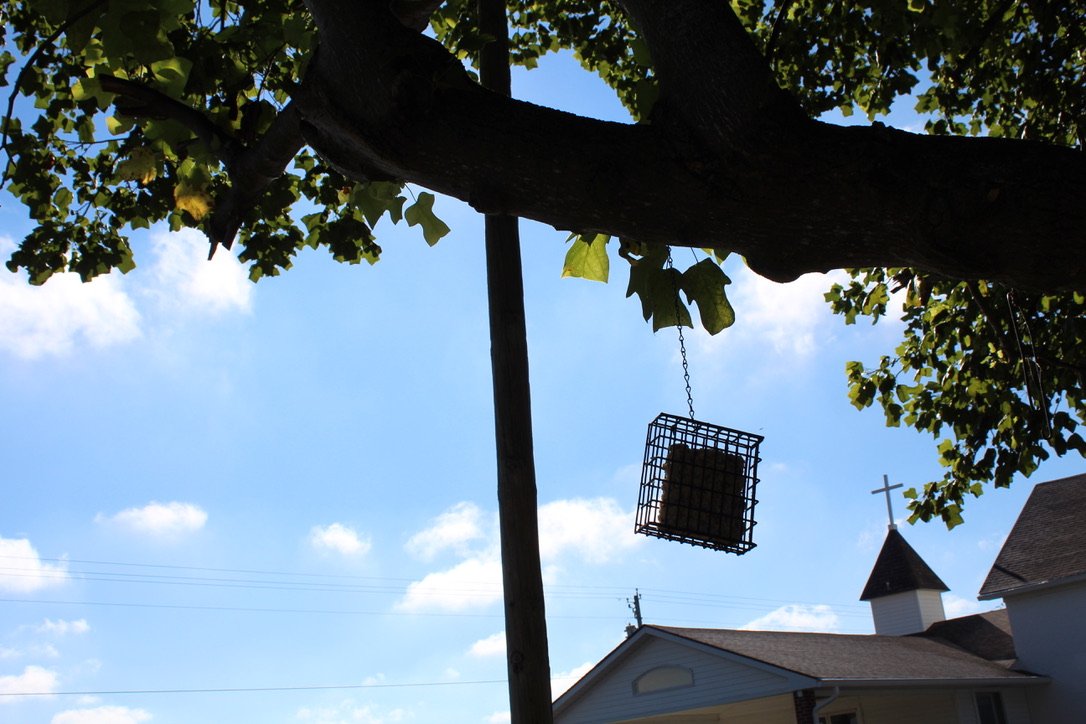Week 6: Word at the Center
This week, my son, John Taylor and I took some time to refill all our bird feeders. Inspired by the life and story of Saint Francis, we got to work pouring seed into little tin houses, shoveling food with sand toys into clear cylinders, and then lifting them carefully back into the trees.[1]
Here, with the birds and insects in the grass, the pace of life slows.
Hymns of creatures become heard, rising up above the droll of machines.
There, with the steeple in the background, we are reminded that ministry is cultivation of real life– tender, local, gritty, life right here.
Getting back into nature, listening to bird song, and holding these small seeds in my hand reminded me of the Word-centered life, the stream saturated by the Word of God. Within this stream, the Word is true nourishment of our souls. Jesus, the Word made flesh, brings us inward to comfort and purify our very core, and then commissions us with words to the rest of creation.
The Word of God is Christ. It is by, through, and in Christ that we receive true nourishment for our souls. Watchman Nee beautifully explains that encountering the Word is not simply hearing about God through listening or reading the scriptures. Nee insists that true “salvation is not knowledge, but meeting Christ.”[2] Christ says “I am the Bread of Life,” the Divine manna. Thus we receive this life not by studying it or simply reading about Him, but by taking God in as part of us, as our Source.[3]
Many of us in the evangelical tradition may see the scriptures and the Word so closely embedded that they blur into one. But even the holiest of words will not “satisfy [our] inner cravings in the Creator.” Salvation begins with hearing and receiving the Word, the Christ, in ourselves. [4]
When our deep hunger is filled, we become new, enlivened from the brink of our death, and resurrected in life. Here, E. Stanley Jones argues that “a new center is formed,” a central identity that is deeply rooted in Christ.[5] Christ draws us into Himself and also into that center where we are indeed one, in communion together. Many mystics describe the deep unity within our souls as we receive Christ into ourselves. This communion grows in depth and constancy as we linger with Him. One way we take the Word in more and more is indeed through sitting in the scriptures. The truly Word-centered (not Bible-centered) life recognizes that the scriptures are the means to a far greater, far more beautiful end– God. And yet they are a gift given to see and hear God in our creaturely state.
I love how Madame Guyon describes the internal dwelling of the Word through scripture. Whether praying the scriptures or using the scriptures as an invitation to behold the Lord, Madame Guyon constantly turns our hearts toward the Divine center:
“set your mind inwardly,”
“turn your mind from outward things to the deep parts of your being,”
“turn all your attention toward your spirit,” and
“[t]he Lord is found only within your spirit, in the recesses of your being, in the Holy of Holies; this is where he dwells.”[6]
Over and over, the eyes of our heart turn inward,
and there in the Divine center of the born again believer,
the Word awaits encounter.
Lest we think that returning to the Divine Center is some kind of ego-trip or spiritual wish fulfillment, John Chysostom warns us that “the devil nestles in our souls.” While many fear the temptation or evil in the outer realities, John Chysostom rallies us to “arm yourself with weapons of the Spirit…and instead, expose him.”[7] Returning to the center may require a combative posture as we are confronted with temptation, lies, and shame threatens to squelch the glory of God revealed within. And thus we do not turn inward alone. Contemporary secular calls to individual meditation or introspection certainly have physiological benefits, but when we are face-to-face with our greatest pains in those inner depths, we are rendered powerless to dismantle them. However, when we follow Madame Guyon’s methods for entering God within through the scriptures, we are clinging to Truth– both in Person but also in narrative– and not only enjoy His presence but in doing so cast out our inner shadows of falsity, pride, and condemnation. But this inner sanctification, we propelled to even sweeter depths, “more than ever, you are drawn upwardly to him.”[8]
And as the Word drives us to our Center, bringing both comfort and purging, we are then sent out. I am reminded of our collective worship each week as I ponder the movement in and out, Word and Table, gathering and scattering. The Word brings us to the depths and that propels us into the world renewed and united with Christ and one another.
We know the Word of God, Christ, the Supreme Revelation follows this pattern in the lives of the saints. Consider Sadhu Sunduar Singh in his early adulthood, tottering on the brink of despair because he tried to enter the depths of the soul without the Light of the world. But in God’s mercy, Jesus was revealed to Singh declaring, “I am the Way.” The depth and radiance of the encounter sent Singh on mission, tottering to neighbors and faraway villages through India and Nepal to witness the deepy joy of God.[9] It was as if Singh knew what E. Stanley Jones wrote in that same region during the same time period: “that which is not expressed dies… He gives seed only to those who sow it. If you don’t sow it, you will have nothing to sow.”[10] Spurgeon describes Whitefield with the same urgency, that the man sounded like he “would die if he could not preach.”[11]
Similarly, when Saint Francis of Assisi encountered the Word through Sister Clare and Brother Silvester, he was empowered and sent out preaching even to the birds:
“My little bird sisters, you owe much to God your Creator, and you must always and everywhere praise him… strive always to praise God.” [12]
I imagine the birds in songs of praise as they chirp, cheep, and titter above us, seeds tumbling silently in the grass below. I consider how our own hands have participated in the feeding of the birds– to give what we have received, to nourish out of our abundance. And the Word, who enters into our own hearts, bringing cleansing and peace, also gives life through our own mouths, words and songs that point others to the Bread of Life. Our words echoing the Word.
And so we join the birds.
Bibliography
[1] This practice was suggested by the life and spirit of Francis of Assisi in “A Harvest of Souls,” from Foster, Richard J., and James Bryan Smith, Devotional Classics: Selected Readings for Individuals and Groups ( San Francisco: HarperSanFrancisco, 1993), 300.
[2] Watchman Nee, “Evangelism,” from Foster, Richard J., and James Bryan Smith, Devotional Classics: Selected Readings for Individuals and Groups ( San Francisco: HarperSanFrancisco, 1993), 326.
[3] John 6:35
[4] Saduh Sundar Singh, “Sharing the Joy with Others,” from Foster, Richard J., and James Bryan Smith, Devotional Classics: Selected Readings for Individuals and Groups ( San Francisco: HarperSanFrancisco, 1993), 209.
[5] E. Stanley Jones, “The Habit of Reading the Bible Daily,” from Foster, Richard J., and James Bryan Smith, Devotional Classics: Selected Readings for Individuals and Groups ( San Francisco: HarperSanFrancisco, 1993), 281.
[6] Madame Guyon, “Praying the Scripture,” from Foster, Richard J., and James Bryan Smith, Devotional Classics: Selected Readings for Individuals and Groups ( San Francisco: HarperSanFrancisco, 1993), 304.
[7] John Chysostom, “Sermon on Dying to Sin,” from Foster, Richard J., and James Bryan Smith, Devotional Classics: Selected Readings for Individuals and Groups ( San Francisco: HarperSanFrancisco, 1993), 312.
[8] Madame Guyon, “Praying the Scripture,” 306.
[9] Saduh Sundar Singh, “Sharing the Joy with Others,” 288-289.
[10] E. Stanley Jones, “The Habit of Reading the Bible Daily,” 283.
[11] Charles Spurgeon, “Sermon on Revival,” from Foster, Richard J., and James Bryan Smith, Devotional Classics: Selected Readings for Individuals and Groups ( San Francisco: HarperSanFrancisco, 1993), 319.
[12] Francis of Assisi, “A Harvest of Souls,” 297-298.



